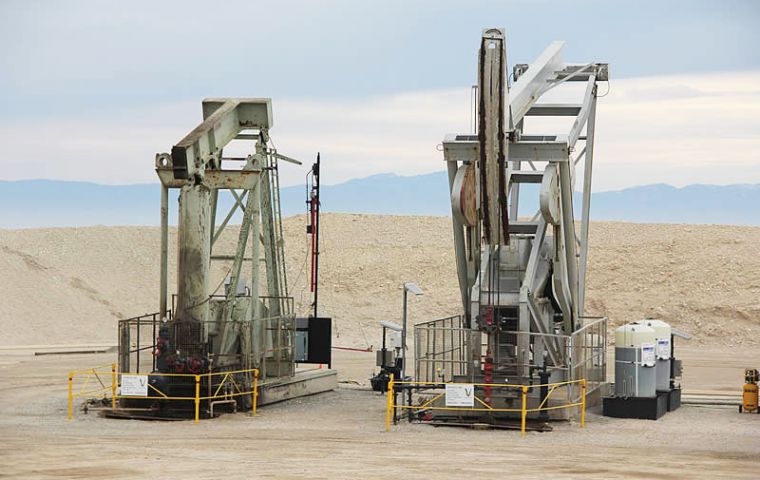MercoPress. South Atlantic News Agency
China becomes world’ biggest net importer of oil displacing the US
 US is increasingly able to support itself after the growth of its domestic hydraulic fracturing, or fracking
US is increasingly able to support itself after the growth of its domestic hydraulic fracturing, or fracking China has knocked the US from its top spot as the world's biggest net importer of oil, US government data shows. The country's fast-growing economy, as well as the rise in car sales, has led to its new status, according to September's data. Oil consumption in China had outstripped production by 6.3 million barrels a day, said the Energy Information Administration (EIA). In the US, the figure was 6.1 million.
China's own oil supply has been outstripped by its economic boom, and its oil fields have been damaged by flooding during the past few months. The country had had to import to make up the shortfall, said the EIA. It predicts the trend will continue into 2014.
The US uses 18.6 million barrels of oil per day compared with China's 10.9 million, despite having a population a third the size of China's.
But the US is increasingly able to support itself after the growth of its domestic hydraulic fracturing, or fracking - a new technique of drilling for gas and oil from shale rock.
It has attracted controversy from environmental campaigners concerned about the large quantities of water used and the potential danger of carcinogenic chemicals. The campaigners say the chemicals could escape and contaminate groundwater.
Jason Gammel, head of European oil and gas research at Macquarie, said he expected the trend to last for the next five years. He said he expected America to produce 20-22 million barrels of oil per day by 2022.
Mr Gammel said: “The US has moved very quickly to utilise fracking and horizontal drilling activities.”
But he said such an approach would be difficult for China to mimic, as the US was already well prepared to take advantage of the new techniques, for example with its large oil field services.
In related news China and the European Central Bank have signed a currency swap agreement worth 350bn Yuan (57bn dolalrs), state-owned Xinhua news agency has said. Such agreements mean the central banks can exchange currencies and firms can settle trade in local currencies rather than in US dollars.
The deal is one of the largest for China as it looks to build a more international role for the Yuan. It will last for three years and can be extended if both parties agree.
Foreign exchange swaps such as these mean two countries agree to swap, or borrow, each other's currency at an agreed rate. In doing so, the parties involved avoid swings in exchange rates. They can also be less reliant on the US dollar for bilateral trade and some business deals.
China's central bank has now signed currency swap deals amounting to some 2.2 trillion Yuan with 22 countries and regions, according to Xinhua including UK; Brazil; Argentina; Korea; Australia, among others.
“The new arrangement will provide more liquidity to the Yuan market in the Euro area, promote overseas use of the Yuan, and help facilitate trade and investment” reported Xinhua quoting China's central bank.
The European Central Bank said: “The swap arrangement has been established in the context of rapidly growing bilateral trade and investment between the euro area and China, as well as the need to ensure the stability of financial markets.”




Top Comments
Disclaimer & comment rules-

-

-

Read all commentsIf China takes most of the oil, will my fuel bills go up?
Oct 13th, 2013 - 12:22 pm 0China is the only global superpower!
Oct 13th, 2013 - 04:30 pm 0@ 1 GeoffWard2
Oct 13th, 2013 - 04:54 pm 0Come on Geoff!
With the tendency of the government to suppress the gasoline prices to prevent riots why should your fuel bills go up irrespective to how much oil anybody buys from Brazil?
Except “Brazil” and “economy” seem to be mutually exclusive words the way things are going presently.
Commenting for this story is now closed.
If you have a Facebook account, become a fan and comment on our Facebook Page!